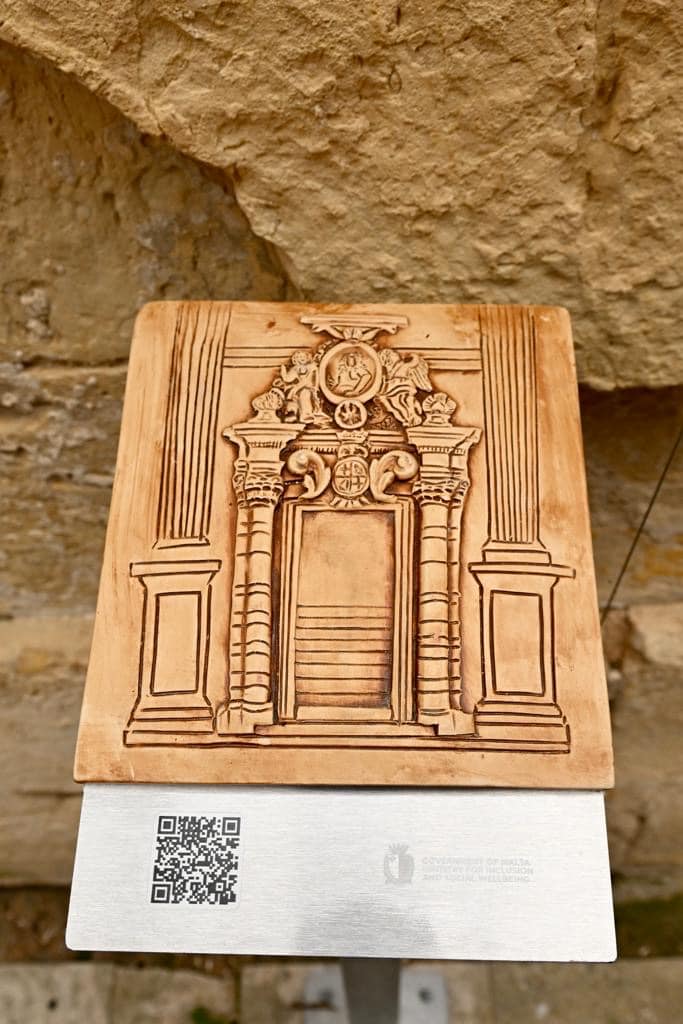Thessaloniki gets ready for its metro launch in November
The underground rapid transit lines have been under construction for almost two decades due to various project delays
 TheMayor.EU logo
TheMayor.EU logo Tourists with visual impairments can feel the plates to get a sense of what historic buildings look like and scan a QR code to listen to more details
On 7 March, the Maltese Ministry of Inclusion, Quality of Life, and Volunteering launched a pilot project that seeks to make tourism more accessible for people with visual impairments. More specifically, Minister Julia Farrugia Portelli unveiled 14 custom-made ceramic plaques that will now stand in front of historic buildings in Mdina and Valetta.
Using their sense of touch, tourists will be able to feel the ceramic replicas and imagine what the landmarks in front of them look like. What is more, the plaques will also feature QR codes which, when scanned, will allow tourists to listen to the history behind the buildings. Commenting on the project, Minister Portelli shared:
“Through this pilot project, we are sending a strong message that when projects are carried out, including tourism projects, we must think about making them accessible to everyone. […] A person with a vision impairment remains a person who wants to travel, wants to explore.”
 One of the 14 plaques (Source: Julia Farrugia Portelli on Facebook)
One of the 14 plaques (Source: Julia Farrugia Portelli on Facebook)
To reiterate, the project will initially run in two cities, Mdina and Valletta, with both destinations having plaques in front of seven historic buildings. Tourists can find the ceramic installations in front of the following landmarks:
Mdina
Valletta
Explaining why it chose Mdina and Valletta for the pilot project, the ministry revealed that 2.7 million tourists visited Malta before COVID-19. According to the Malta Tourism Authority, 70% of travellers visited Mdina while 90% travelled to Valletta. As such, the ministry saw the need to make these destinations more accessible for all.

The underground rapid transit lines have been under construction for almost two decades due to various project delays

Now you can get your wine in Talence by paying directly in Bitcoin

That’s because the state has to spend money on updating the railway infrastructure rather than subsidizing the cost of the popular pass

Rethinking renewable energy sources for the urban landscape

The examples, compiled by Beyond Fossil Fuels, can inform and inspire communities and entrepreneurs that still feel trepidation at the prospect of energy transition

Now you can get your wine in Talence by paying directly in Bitcoin

The 10th European Conference on Sustainable Cities and Towns (ESCT) sets the stage for stronger cooperation between the EU, national and local level to fast track Europe's transition to climate neutrality.

At least, that’s the promise made by the mayor of Paris, Anne Hidalgo

The underground rapid transit lines have been under construction for almost two decades due to various project delays

At least, that’s the promise made by the mayor of Paris, Anne Hidalgo

Hostal de Pinós is located in the geographical centre of the autonomous region

Despite its church-y name, the district has long been known as the hangout spot for the artsy crowds

Urban dwellers across the EU are having a say in making their surroundings friendlier to people and the environment.

Forests in the EU can help green the European construction industry and bolster a continent-wide push for architectural improvements.

Apply by 10 November and do your part for the transformation of European public spaces

An interview with the Mayor of a Polish city that seeks to reinvent itself

An interview with the newly elected ICLEI President and Mayor of Malmö

A conversation with the Mayor of Lisbon about the spirit and dimensions of innovation present in the Portuguese capital














